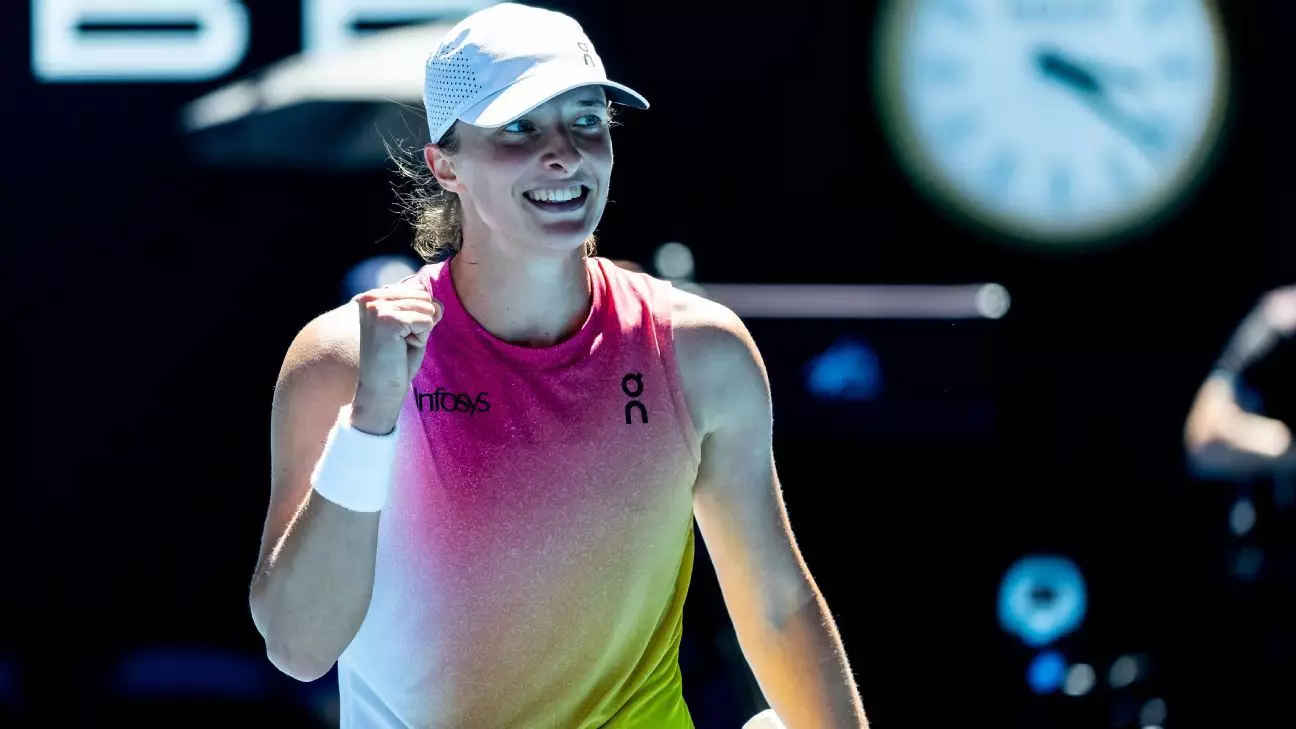In a display of power and finesse, Iga Swiatek strolled into the semifinals of the Australian Open, showcasing her prowess with an impressive 6-1, 6-2 victory over eighth seed Emma Navarro. The Polish sensation, seeded No. 2 in the tournament, displayed not just skill, but an overwhelming confidence throughout her matches. Remarkably, Swiatek has journeyed through the tournament without dropping a set, surrendering a scant 14 games in total—a feat reminiscent of Maria Sharapova’s remarkable run in 2013.
Swiatek’s performance was marked by a blend of strategic acumen and competitive spirit. Reflecting on her journey thus far, she expressed satisfaction but also a hunger for more. “Being in the semis is great. I’ll push for more,” she remarked, emphasizing both her contentment and her ambition as she sets her sights on securing not only her first Australian Open title but also her sixth Grand Slam overall.
Swiatek’s upcoming match against No. 19 seed Madison Keys adds an intriguing dynamic to the semifinal stage. Keys has been formidable in her own right, securing her spot after a tumultuous battle against Elina Svitolina that ended in a 3-6, 6-3, 6-4 victory. This showdown in the semifinals marks her third appearance at this stage in Melbourne. Despite the history—Swiatek has a favorable 4-1 record against Keys—there remains a palpable tension, characteristic of high-stakes competitions.
What stands out about this year’s tournament is not just the talent on display, but the narrative surrounding each player. Keys, a past finalist at the US Open in 2017, has had her share of struggles, having faced devastating losses in previous Australian Open semifinals. Yet this year, she arrives with renewed determination, aided by a recent title in a hard-court event and a ten-match winning streak.
Analyzing Swiatek’s Game
Swiatek’s game is built on a solid foundation of resilience and adaptability. In her quarterfinal match, she faced a moment of contention regarding a potential double bounce during a critical point—an incident emblematic of the intense scrutiny players often undergo. However, rather than allowing such distractions to derail her focus, Swiatek displayed remarkable composure. “It was much tougher than the score says,” she acknowledged, offering insight into her mindset; she respects her opponents and recognizes the nuances of each match.
Her tactical approach concentrates heavily on maintaining intensity and focus. This mindset has allowed her to effectively dissect her opponents’ strategies and capitalize on their weaknesses, indicating a level of maturity and understanding of the game that is often seen in seasoned players.
Madison Keys, on the other hand, brings a contrasting style to the court—a blend of strategic play and raw power. Notably, her ability to adjust during matches has been crucial to her success. Against Svitolina, she embraced a more aggressive stance, frequently pushing toward the net—an area where she won an astounding 23 of 26 points. This tactical shift signifies her evolution as a player, as she learns to balance her naturally aggressive style with a more calculating approach.
However, Keys acknowledges the difficulty that comes with facing Swiatek. “Iga is tough to beat,” she declares, highlighting the latter’s multifaceted skill set, including her effective returning and serving capabilities. As the players prepare for their clash, the anticipation builds—not only for what is at stake but also for the unique styles and strategies each competitor brings to the table.
As the semifinals loom, the spotlight is firmly on Swiatek and Keys. Both players possess the talent and determination to reach the final, yet it will be their ability to adapt, strategize, and execute under pressure that will ultimately determine who advances. The tennis world watches with bated breath, eager to witness the unfolding of this exciting narrative at the Australian Open, where dreams of glory, rivalry, and sportsmanship collide on the grand stage of tennis.

